Non-Crazy Questions (III)
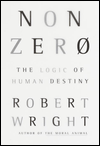 I've been considering the arguments by Robert Wright, made in his book Nonzero: The Logic of Human Destiny, to the effect that evolution theory need not be anti-God. The previous post in this series was Non-Crazy Questions (II). In it I took up the subject of human sentience or consciousness, the inner, private experience or awareness we each have of what our individual mind is knowing, thinking, feeling, and doing.
I've been considering the arguments by Robert Wright, made in his book Nonzero: The Logic of Human Destiny, to the effect that evolution theory need not be anti-God. The previous post in this series was Non-Crazy Questions (II). In it I took up the subject of human sentience or consciousness, the inner, private experience or awareness we each have of what our individual mind is knowing, thinking, feeling, and doing.Wright says this sort of subjective experience is superfluous, or epiphenomenal, to that sort of brain activity which is truly causal in the world. It is to physical causality as a shadow is to a solid body. Consciousness is always the effect of physical causes, never a cause in itself. Strictly speaking, it has no function. It doesn't do anything.
Accordingly, it is invisible to Darwinian natural selection. Our sentience makes us no "fitter," in Darwin's sense of the word, than we would be if we were zombielike "robots with unusually good skin" (p. 320). Such flesh-and-blood "robots" would be just as successful at surviving and sending their genes into the next generation as are we.
Yet it is our very sentience that gives our lives meaning, dignity, and moral worth. If we were no more than clever androids — sentience-bereft bipeds — there would be nothing immoral about terminating us: in Wright's phrase,"unplugging [us] for good," like an outmoded computer (p. 321).
Hence our sentience and moral worth are joined at the hip, says Wright, and Darwin's theory of evolution via survival of the fittest can explain neither. That's why it's a non-crazy question to ask whether, after all, there is a God. For one thing, God's creativity provides a handy answer to the question of where our sentience comes from. For another, the existence of God explains why we have personal, epiphenomenal consciousness: presumably, because we are made by God "in his image."
A lot rides on the notion, accordingly, of human consciousness being epiphenomenally redundant and evolutionarily superfluous. If Wright is on target about that, then it becomes much harder to believe that there is no God.
This is particularly true in view of Wright's other main point, that evolution is directional and flexibly goal-oriented. Put most simply, the goal seems to be one of making brains — and possibly, soon, a global "superbrain" — which, in ways science can't elucidate, become conscious.
In order for that to happen, organisms (and, later, cultures established by "smart" organisms like Homo sapiens) must blossom in complexity, as the eons roll by. The logic behind all this blossoming of complexity is "non-zero-sumness," a long-haul preference on the part of natural and cultural selection for inventing entities capable of mutually assistive intercommunication and "cooperative coordination" (see p. 322).
Thus does supposedly blind, aimless natural selection design an ever more complex "tree of life" on planet Earth. And thus does an entirely similar process take the human species from its earliest simple hunter-gatherer cultures to the ultra-complex global society of today.
As all this transpires, there develops a lot more amity and a lot less enmity in the world. The "bonding power" of our "new technologies of interdependence" may be leading us all to a world of "true empathy." We are likely being brought to "the realization that, fundamentally, all human beings are alike" (p. 328).
That, in turn, is one of the signal hallmarks of religious belief in God: unconditional love for one's neighbor, even if the "neighbor" lives halfway around the world, is obedience to God's will.
In consequence, the question of whether biological and cultural history are directional and flexibly goal-oriented (the philosophers' term for this being "teleology") bears equally, along with the question of sentience as the substrate of moral worth, upon the question of God's existence.
In the previous installment, I promised to take up the question of how the existence of various "godless" versions of Darwinian evolution, alongside Wright's God-possible version of evolution, Peacocke's God-certain version, and the Intelligent Design outlook, might be folded into how we educate our children. Before I can do that, I now see that I'll need to lay out a schema by which these various contrasting views can be compared.

 Among the "godless" versions of evolution theory is that propounded by Richard Dawkins in books such as The Blind Watchmaker. Also, the writings of the late Harvard paleontologist Stephen Jay Gould belong here in this category. True, Gould was an agnostic, where Dawkins is pretty close to out-and-out atheism. Gould could write in Rocks of Ages: Science and Religion in the Fullness of Life that science (particularly, that of evolution) are "twin magisteria" that can peacefully coexist. Science teaches us how nature works, and religion gives us our morality and ethics. In Gould's view, the two have non-overlapping teaching authorities. (In Dawkins's view, religion has no teaching authority whatever.)
Among the "godless" versions of evolution theory is that propounded by Richard Dawkins in books such as The Blind Watchmaker. Also, the writings of the late Harvard paleontologist Stephen Jay Gould belong here in this category. True, Gould was an agnostic, where Dawkins is pretty close to out-and-out atheism. Gould could write in Rocks of Ages: Science and Religion in the Fullness of Life that science (particularly, that of evolution) are "twin magisteria" that can peacefully coexist. Science teaches us how nature works, and religion gives us our morality and ethics. In Gould's view, the two have non-overlapping teaching authorities. (In Dawkins's view, religion has no teaching authority whatever.)Dawkins and Gould are both on the extreme left in the evolution debate, inasmuch as both maintain that evolution is aimless and directionless. Gould gives us the metaphor of evolutionary history as a tape recording which, were it to be rewound, erased, and re-recorded, would almost certainly not produce the likes of our smart, "in-God's-image" species again. We are here accidentally, in the view of Gould and Dawkins.
On the extreme right are the creationists who say the Bible is literally true: God created all living species, including us, in six days at the beginning of time. If the Bible is furthermore read literally in terms of the number of generations which are said to have followed Adam and Eve, God's initial creative act must have occurred no more than a few thousand years ago ... whereas science says life on earth is perhaps 3.5 billion years old, and the universe much older that that.
Almost as far to the right as the six-day, young-earth creationists are the purveyors of Intelligent Design theory, such as William Dembski and Michael Behe. True, IDers accept an old earth and a succession of species leading to man. But each separate species had its design imposed on it from above, somehow. In ID theory, God's intelligent imposition of design on matter was simply spread out in fits and starts over time. Each time a new level of complexity had to be attained, be it an eye, a wing, or a whole species, God stepped in.
The far right and the far left in this debate over Darwinism, oddly enough, have at least one major assumption in common. Both sides seem to agree that, if there is a God and if God was active in making earth's living species, it had to be by some imposition of the divine will.
The creationists say God imposed his biological will on the physical world at the very outset, before the Fall of Man in the Garden of Eden and Noah's Flood. The IDers concede that the imposition of divine will was more spread out, timewise — but, still, it happened. God still made us and all other species, and he did it by fiat.
The evolutionary far left says, simply, that genesis-by-fiat never happened. If there even is a God, he didn't have anything to do with earthly bio-evolution and the origin of species. There is no vestige of divine design or supernatural will in the aimless evolutionary process that just so happened to produce the likes of us. For, the unstated assumption runs, if God had been involved at all, it would have had to be by virtue of lordly will-imposition and fiat.
So left and right agree on one thing: God's creation of living kinds, if it happened, was, or would perforce have been, a matter of God's imposing beneficent divine design on an otherwise recalcitrant, chaotic world.

 Both left and right, in this debate, are upbraided by the center. Arthur Peacocke, author of Paths from Science Towards God, can be taken to speak for the center by way of Denis Edwards's The God of Evolution: A Trinitarian Theology. In his book, Edwards, a Catholic priest, suggests ways in which the standard Darwinian theory (minus certain atheistic insistences by the likes of Gould and Dawkins) can be squared with standard Christian theology.
Both left and right, in this debate, are upbraided by the center. Arthur Peacocke, author of Paths from Science Towards God, can be taken to speak for the center by way of Denis Edwards's The God of Evolution: A Trinitarian Theology. In his book, Edwards, a Catholic priest, suggests ways in which the standard Darwinian theory (minus certain atheistic insistences by the likes of Gould and Dawkins) can be squared with standard Christian theology.One of the potential sticking points addressed by Edwards is the large role of chance in evolution, inasmuch as genetic mutations are said to happen entirely at random. But that problem disappears, says Edwards, if "God is ... pictured as involved creatively in an open-ended process that involves both randomness and lawfulness" (pp. 49-50, italics added by me).
That's where the ideas of Peacocke come into the picture:
Arthur Peacocke argues that we need to conceive of God as "involved in explorations of the many kinds of unfulfilled potentialities of the universe," potentialities which have been given to the universe by God. According to Peacocke, these are propensities in nature which God has "built in." These [propensities] "load the dice" in favor of life, increased complexity, and consciousness. (p. 51)
God is accordingly "an explorer in creation," an "improviser of unsurpassed ingenuity" whose "redemptive and providential actions" nonetheless stop short of imposing divine will by fiat "in the community of free beings."
 Here we encounter the metaphor of God "loading the dice" of worldly chance and change, a apt phrase to summarize Robert Wright's abstract notions of directionality and teleology in evolution. The phrase is also an apt companion for the ideas of Stuart Kauffman in At Home in the Universe about our species having been "we the expected."
Here we encounter the metaphor of God "loading the dice" of worldly chance and change, a apt phrase to summarize Robert Wright's abstract notions of directionality and teleology in evolution. The phrase is also an apt companion for the ideas of Stuart Kauffman in At Home in the Universe about our species having been "we the expected."Notice that Peacocke is strongly pro-religion, Wright leans (albeit somewhat reluctantly) in a religious direction, and Kauffman doesn't give away his religious proclivities, if he has any. He, for all I know, might even be an atheist. Yet all three inhabit the center in the evolution debate, by virtue of their unanimity on one crucial point. All three find some sort of beneficent directionality, some sort of teleological goal-seekingness, in evolutionary processes.
In other words, God (if there is one) doesn't have to impose his blueprints on a recalcitrant material universe. The universe at a quite fundamental level cooperates in bringing about God's good ends.
With that schema for the debate in mind, I now feel I can actually proceed with considering how evolution ought to be taught in schools. More on that in the next installment, Non-Crazy Questions (IV)!






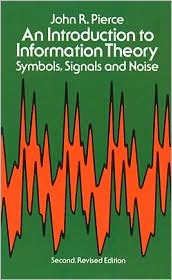

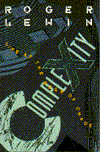


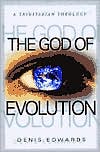

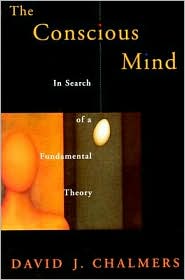
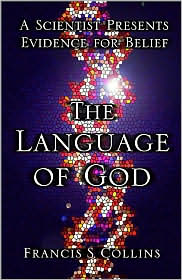


1 Comments:
http://en-galetelapuntesuno.blogspot.com/2005/10/4-spirit.html
Post a Comment
<< Home